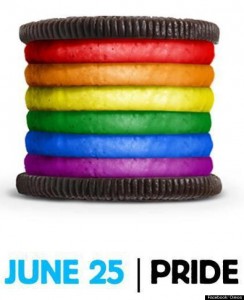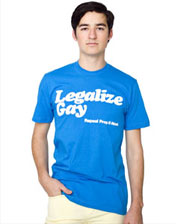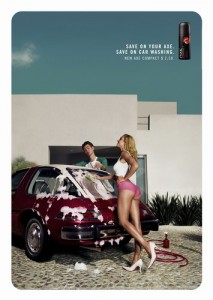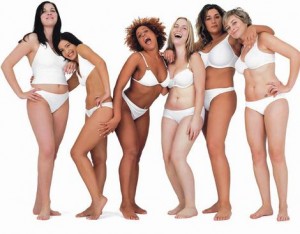Christine Cheung’s blog post “Online ads: What makes them successful?” brought Oreo’s “Daily Twist” ad to my attention. The ad, posted on Kraft Food’s U.S. Facebook page, features a six-layered Oreo cookie that is rainbow-coloured in support of the gay rights movement in the United States. Christine regards the ad as very successful: despite its simplicity, it carries a much deeper social message. I would agree; the “Gay Oreo” has got over 140,000 likes and 19,000 comments on Facebook. However, the ad campaign faced harsh criticism with comments such as “gays need to leave America” and “this is absolutely disgusting”.
Let’s look at a few other examples of LGBT-friendly ads:
American Apparel’s “Legalize Gay” T-shirts
Originally in opposition of Prop 8 in November 2008, which provided that “only marriage between a man and a woman is valid or recognized in California”, American Apparel starting printing t-shirts reading “Legalize Gay”. Since then, it has given away over 50,000 of these shirts. On its website, American Apparel states that it “believes in freedom, expression and equality, things that are inherently condemned in the prohibition of gay marriage”.
Amazon’s “Husbands” Ad
In a television commercial for its Kindle e-reader, Amazon sends a gay-friendly message that has been generating both positive and negative buzz, other than the usual conservative criticisms. In the ad, a man and a woman sit on the beach and compare the iPad to the “superior” Kindle. The man proclaims that he’s just ordered a Kindle Paperwhite, and suggests they “celebrate”. The woman replies that her husband is already buying her a drink, and the man responds “so is mine!”. Some critics argue that the punch line is underwhelming or that it does not really fit with the plot of the commercial. However, the fact that the punch line is unsurprising means that LGBT-friendly marketing has been making progress.
Sources:
http://www.thestar.com/life/2012/06/27/pridethemed_oreo_unleashes_cookie_controversy.html
http://en.wikipedia.org/wiki/California_Proposition_8
http://www.americanapparel.net/legalizegay/
https://www.youtube.com/watch?v=AnmDlk6F3d0
http://www.adweek.com/adfreak/amazons-gay-kindle-spot-nice-surprise-or-little-forced-147758
http://www.policymic.com/articles/28450/new-kindle-gay-marriage-commercial-paperwhite-ad-signals-changing-times





Recent Comments